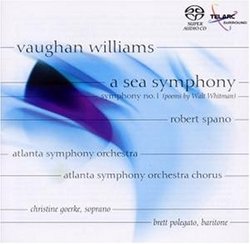| All Artists: Atlanta Symphony Orchestra Title: Vaughan Williams: A Sea Symphony Members Wishing: 0 Total Copies: 0 Label: Telarc Release Date: 6/28/2002 Album Type: Hybrid SACD - DSD Genre: Classical Style: Symphonies Number of Discs: 1 SwapaCD Credits: 1 UPC: 089408058806 |
Search - Atlanta Symphony Orchestra :: Vaughan Williams: A Sea Symphony
CD Details |
CD ReviewsA sea without fever P. SIMPSON | North Yorkshire, United Kingdom | 09/06/2003 (4 out of 5 stars) "I'll nail my colours to the mast by stating that the Sea symphony is my least favourite of Vaugham Williams nine, but I bought this (rather than wait until the Hickox came out) because wanted to see who got closest, the American reviewers who praised it to the skies (especially for sonics) or good old anglo-centric, anglo-philiac Gramophone (who gently disparaged it). Needless to say, my reaction comes about half way between the two.
The sonics have been widely praised and won a Grammy. I can understand the praise and the win, - the recording copes with every crashing wave and orchestral climax, and this is a performance which keeps 'em coming. It captures voices beautifully and for most of the time choir and orchestra are clearly and naturally presented. My only real complaint is that, especially in the first movement, I felt that the soundstage wasn't integrated, - it was as if two different orchestras and choirs were playing almost, but not quite simultaneously, left and right. Maybe my ears accommodated, because it didnt bother me after that. A more minor complaint is my usual one that there is more to most music than a contrast between loud and soft (not that the performance would indicate that) and there is less mid-range warmth than I'd like. Like the performance, the sound is a bit monochromatic.You'll have gathered by now that I'm not rapt in the performance, though it has many good individual features. The Choir is truly excellent and the Atlanta SO yet again, virtuosic. Baritone Brett Polegato is a little light on but is warm- rather than acid- toned, as some light baritones can be. He also sings tunefully, instead of with that strangulated anal-hernia, plum-mouthed voice that english male singers tend to put on for english music. The principal problems are with soprano Christine Goerke and Spano's overall guidance. Ms Goerke is one of that breed of soprano who would have been better born a mezzo, - she warbles uncomfortably at times and ends up hooting and braying. When she's caught in the middle-register, which, to be fair to her, is most of the time, she's very good, but when she strays outside it, her shortcomings are exposed. There is just no compariosn between her and (my own favourite in this piece) Felicity Lott (for Haitink) or Joan Rodgers (for Handley). Lott, in particular, captures the sensuality of the writing, in a way which neither Spano nor Ms. Goerke begin to realise. And that's my main problem with Spano's direction. Yes, it is meant to be fast and furious and it certainly generates the "Wow" factor. And yes, let's face it, the symphony can be boring. Spano shaves some 10 minutes off Haitink, and there are some gains in this approach in terms of excitement. The problem is, that's all you get. Like the recording's fixation on loud and soft, Mr Spano's is on fast and slow. Again, there's nothing in the middle, nor at the fringes. No subtlety, no sensuality (and surely Whitman's words call for them). This sea is all storm and movement, no sunshine or shallows. That's where Haitink is so good, at maintaining intellectual control over this sprawling canvass whilst recognising colour and variation, features which Mr Spano doesn't even attempt to find. And Handley too finds more warmth in the sea than Spano, - there's a gulf stream in his performance, whereas it's clear Spano hasn't even been to the beach in Georgia's south-east.I guess I'm going to have to eventually get the Hickox after all, hoping that he steers a middle course, with some of Spano's drive and some of Haitink's restraint. But I will still play the Spano until then, whenever i need sails unfurled and Nelson at the helm." |

